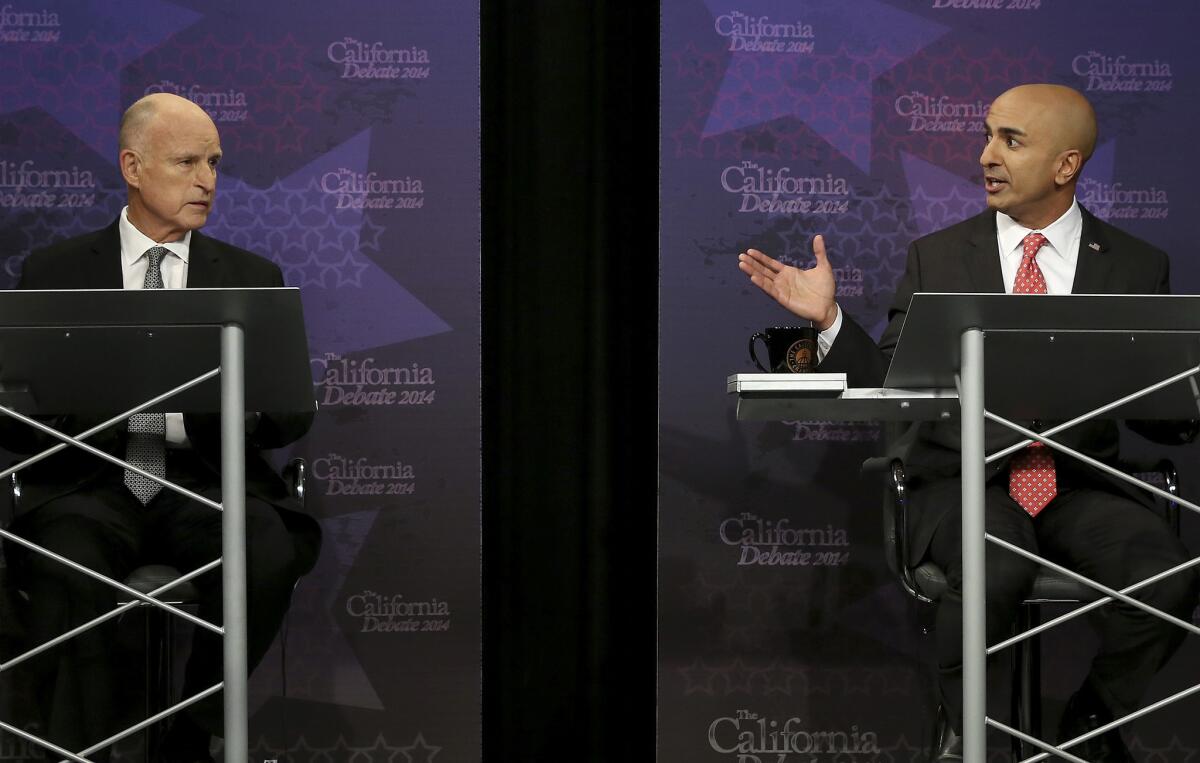Jerry Brown vs Neel Kashkari: A governor’s debate that changed little

- Share via
Entering Thursday night’s gubernatorial debate, Democrat Jerry Brown had one imperative: not to step in it.
Republican Neel Kashkari had a far more difficult challenge: to knock off California’s governor at a time when the state has grown markedly more upbeat.
When it was over, in the hackneyed tradition that surrounds such events, Republicans declared Kashkari the victor just as Democrats gave the win to Brown. The reality: nothing occurred Thursday night that appeared to have altered the profile of a race that remains frozen barring an epic Brown failure or a monumental Kashkari surge.
With no stunning surprises, the debate as much as anything else was a reminder of the importance of image in politics, and how it can serve as ballast or albatross.
Brown has spent 40 years in California politics, and not without considerable skill. Derided nationally — for supporting things that seem pretty basic today, like satellites in the skies and computers in the classroom — he has had an underappreciated ability to read the mood of Californians, and adjust accordingly.
Part of his secret has been that very few adjustments have been needed. From his tenure as governor in the 1970s, Brown has always given off the vibe of a cheap date, in keeping with the state’s inherently skinflint fiscal preferences. He is more moderate on social issues, but is far from the cutting edge even among Democrats in Sacramento—again, in keeping with a state that is more centrist than outsiders believe. For decades he has built alliances with the state’s rapidly expanding Latino population, as if anticipating their rapid political ascendance.
All of those facets of his image blunted points that Kashkari tried repeatedly to make on Thursday: that Brown was a profligate spender, an elitist who ignored the middle class and didn’t grasp the immigrant experience and who was a tool of what the Republican called Brown’s “rich, powerful family.”
California’s populace is legendary for ignoring its politicians, save for briefly around election time, but for even the most disconnected voter, there had to be some dissonance between how Californians have experienced Brown—who has presided over job growth and increased satisfaction with the state, as he was happy to point out—and the version of the governor portrayed by Kashkari.
The Republican challenger acquitted himself well for a beginner, but he had a bigger problem beyond California’s long familiarity with Brown: the state’s disdain for the party Kashkari represents. Over and over, Kashkari sought to distance himself from the toxic Republican brand, moves freighted with danger that he would alienate GOP voters even as he sought to attract the state’s dominant independents and Democrats.
“I’m an aerospace engineer, I believe in the science behind climate change,” Kashkari said early on. Later, he would applaud same sex-marriage and hug the center on immigration issues.
The wrestle over image may have been most acutely felt when Brown hammered at Kashkari’s links to Wall Street—subtext: Republicans as defenders of the rich -- while Kashkari cast himself as anything but the stereotypical GOP candidate.
“My dad wasn’t governor. My parents were immigrants,” Kashkari said at one point, in one of several gibes at Brown’s family. (And that raised a tactical question: Those listening who didn’t know Brown’s father, Pat, also served as governor were likely mystified. Those who did are likely to recall Pat Brown favorably as a creator of modern California, a notion Kashkari himself forwarded at one point.)
Tonally, Kashkari’s task Thursday night—as it has been throughout his candidacy—was a difficult one. He had to somehow convince Californians that a governor they like and resoundingly elected four years ago is not up to the task, and do so in a way that exuded the optimism that voters here want in their politicians.
More often than not, that was left to Brown, who sweated positivity: about the 1.4 million jobs restored in the last four years, about California again feeling like “the place of dreams.”
“We’ve got momentum and we’re headed in the right direction,” a chipper Brown said. It was as if he was daring anyone to risk changing course.
For political news and analysis, follow me on Twitter: @cathleendecker
More to Read
Sign up for Essential California
The most important California stories and recommendations in your inbox every morning.
You may occasionally receive promotional content from the Los Angeles Times.














